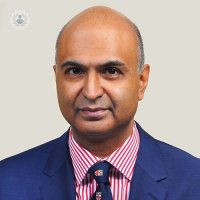Heart murmurs, heart disease, and chest pain, oh my!
Written in association with:There can be uncomfortable or painful sensations in the chest and heart. These can be worrisome, and sometimes they are harmless, but sometimes they need to be examined by a medical professional. Expert consultant cardiologist Dr Vinay Kumar Bhatia discusses common feelings and explains when you should worry.

What does my heart do?
The heart is an incredible muscle in the human body. Basically, it is a really strong muscle pump that works hard and sits in the centre of the circulatory system. Within the UK, during the average healthy lifespan the heart will pump out blood approximately 3 billion times, which is a feat that is unmatched by any man-made machine.
How common is coronary heart disease?
It is the leading cause of death in the UK. About 74,000 deaths each year are a result of coronary heart disease. This is about one in five men and one in eight women within the population.
At what age am I likely to be at risk of coronary artery disease?
Increasing age is an underlying process that leads to coronary artery disease to some extent, but there is no particular age where the risk increases. Although, if you have one or more of the following factors, it is known that the risk increases:
- smoking
- high blood cholesterol
- high blood pressure
- diabetes or pre-diabetic state
- being overweight and obesity
- lack of physical activity
- unhealthy diet
- stress
- sometimes age, gender, and family history
I have noticed when I exercise, I get out of breath. Should I be worried?
There are a variety of causes for breathlessness upon exertion. However, one of the more serious options is structure or function abnormality of the heart. If you are becoming out of breath persistently and it is not normal for you, you should schedule a visit with your doctor.
I have recently been to my GP because I am very aware of my heart beat. I have been told that my ‘ECG’ has come back normal. However, I am still very aware of my heart beating. Should I still be concerned and what can I do?
Continual and atypical awareness of heartbeats is called having palpitations. In most cases, they are not associated with a serious heart condition, but are typically due to extra beats interrupting your normal heart rhythm. This is known as ectopy, which is a usually a benign condition. If these symptoms, though, continue, you should get a formal clinical assessment. This often includes blood tests, heart rhythm recording, and an echocardiography (heart ultrasound investigation). A small percentage of people have more serious heart rhythm disorders, some possibly being genetic.

What is the best diet for a healthy heart?
As usual, a well-balanced diet is best. This includes lots of fresh fruit and vegetables; a decent amount of starchy foods like bread, rice, and potatoes; protein sources such as some dairy products, meat, fish, eggs, and beans; and only a little amount of food and drink high in fats and/or sugar. Normally, sufficient salt is contained in the food we buy, so adding extra should be limited when cooking.
I went to see my GP for a routine check-up and I was told that I have a heart murmur. What has caused this and should I be worried?
There is a specific noise made by a heart murmur that a doctor will hear when listening with a stethoscope. If your general health is good, there may not be a significant underlying heart disease causing the murmur. However, we have the means to use an echocardiograph and assess the structure of the heart in great detail, eliminating x-rays and drugs which can be harmful. This is a bedside technique with a quick diagnosis.
I have a history in my family of heart attacks. How can I make sure this doesn’t happen to me?
Of course, heart disease running in a family history is an important risk factor. But some family members may add to their risk, for example by smoking or having an unhealthy diet. Other genetic factors may add risk, such as very high blood pressure or cholesterol. You should make an appointment with your doctor if you have an immediate relative with premature (less than 55 years old for men and 65 years old for women) who experienced coronary artery disease (i.e. heart attack, previous coronary stent procedure, or angina).
Is chest pain a sign of heart disease? What should I do if I experience this?
As with murmurs, there are a variety of causes of chest pain. Although, underlying coronary artery disease may be significant cause of chest pain – this is known as angina. Even though there is not a universal set of symptoms used to diagnose, if you experience any chest discomfort brought on by exertion, stress or getting upset which goes away when relaxed, or if the pain is associated with tightness in jaw, arms, or neck, then seek immediate medical attention.
Don't leave your heart chest pain concerns go unchecked. Schedule a consultation with Dr Vinay Kumar Bhatia on his Top Doctors profile.


